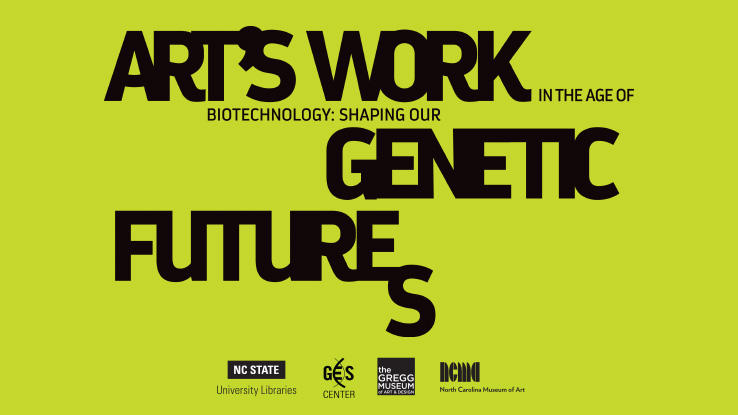
Symposium on biotech art exhibition to be held Oct. 18

The NC State University Libraries will host a symposium to discuss the new, multi-site exhibition Art’s Work in the Age of Biotechnology: Shaping Our Genetic Futures. The symposium will bring together artists participating in the exhibition as well as humanists and social/natural scientists who will use the exhibition as a departure point for conversations about the future of biotechnology and genetics.
The symposium takes place Friday, Oct. 18 from 2:00 p.m.-5:30 p.m. in the Hill Library Auditorium. The sessions are free and open to the public, but pre-registration is required on Eventbrite.
The exhibition itself opens the evening before with an event at the Gregg Museum of Art & Design. Exhibits will be on display through March 15, 2020 at the Gregg and at both the Hill and Hunt Libraries. Additionally, From Teosinte to Tomorrow, a corn maze in the North Carolina Museum of Art museum park, will be up through Oct. 31. For more on the artwork in the exhibition, visit: go.ncsu.edu/artswork.
The full schedule for the symposium is as follows:
2:00 p.m.-3:00 p.m.: Biotechnology as Culture
Moderator: Priscilla Wald
Panelists: Joe Davis, Jennifer Willet, Ciara Redmond, Kirsten Stolle, and Rich Pell
What is the relationship between luck and genetics? Between biotechnology and phenotypic outcomes? Between individual choices and corporate coercion? And in what ways can artists make use of the culture to make comments on biotechnology, genetics, and science more broadly? Joe Davis and Ciara Remond have both approached the concept of luck in their work, while Jennifer Willet, Rich Pell, Maria McKinney, and Kirsten Stolle have different takes on ways of using identifiable cultural markers to draw audiences into conversations about biotechnology. This panel will explore how biotechnology is culture and the ways that culture can be used to leverage new possibilities for thinking about genetic futures.
3:00 p.m.-4:00 p.m.: Genetic Arts Intervening in the Anthropocene: Climate, Geoengineering, and Ecosystems
Moderator: Jason Delborne (Science, Policy and Society)
Panelists: Aaron Ellison, David Buckley Borden, Jon Davis, Joel Ong, Erin Kirchner, and Rachel Rusk
Art’s Work in the Age of Biotechnology features a number of works which investigate the way that changes on our planet are related to genetic change or biotechnological affordances. In this panel, the creators of the Novel Ecosystem Generator, Kerasynth, Terra et Venti, and the animations behind Teosinte to Tomorrow will introduce how their work grapples with global environmental change, discuss why art and design are great mediums for addressing the anthropocene, and what the future holds for art about these issues.
4:00 p.m.-5:00 p.m.: Art and Identities: From Surveillance and Privacy to Collective Identities and Personal Choices
Moderator: Patsy Sibley (Women’s Studies)
Panelists: Charlotte Jarvis, Paul Vanouse, Adam Zaretsky, and Emeka Ikebude
Ideas about identity have swirled around developments in human genomic science since its inception. Surveillance and privacy have been investigated throughout the first generation of bioart, including cutting edge work by Paul Vanouse and Heather Dewey-Hagborg. Vanouse’s more recent work, like the America Project, exhibited in this show grapples with collective identity. Emeka Ikebude’s “Fragments” works with the opposition between individual genetic codes and microbiomes which are also largely shared with other people. Issues of diversity have been present in the work of the scientists of the human genome project and the artistic critiques of this work that followed. In other work, Adam Zaretsky asks about human genetic possibilities for the future and he will discuss how his botanical work in Errorairum relates to those inquiries about human futures. Charlotte Jarvis’ In Posse brings attention to ideas about gender and feminism. This panel will discuss the relationships art draws out between science and identities.
The symposium will conclude with an open conversation on how we develop richer interfaces between artists and scientists in determining our genetic futures.
Art’s Work/Genetic Futures is guest-curated by Hannah Star Rogers, an independent curator and Visiting Scholar at the University of Edinburgh, and is organized by the NC State University Libraries and the Genetic Engineering and Society Center.